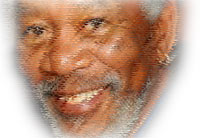In a recent issue of "21st Century Christian", there was an article by a fellow named Silas Shotwell. His thought was about praying for people by name. I almost skipped over it. I'm glad I didn't.
Too often, I think, we allow our prayer to be one of a handful of memorized poems we recite based on the occasion; mealtime, bedtime, even (and maybe especially) when we are offering public prayers. Sure, we insert the names from "the sick list" in our recitations, but often this can be more formality than true intercession.
What do I mean by that? And how dare I suggest that we can be an intercessor? Jesus Christ and the Holy Spirit are our intercessors!
The fact is, an intercessor is simply anyone who speaks on behalf of someone else. And any of us can do that for anyone else, at least when it comes to our conversation with God. But intercession is a personal appeal, not a generic petition.
Shotwell talked about praying with his family for a host of individuals. Frequently these were people they didn't know personally, but they prayed for them specifically. One time they prayed for each person in the United States Senate ... by name. On this occasion they also took the time to drop notes in the mail to each one letting them know someone was praying for them personally. They received several thank you notes ... personal thank you notes.
A few days later the phone rang. The voice on the other end said, "Mr. Shotwell? This is Senator John Glenn. I just wanted to call and thank your family for praying for me. I need your prayers. I've been in combat and I've been in space, but those are child's play compared to being in the Senate. I need God's help daily."
Just because we don't know someone doesn't mean we can't pray for them personally. Maybe we hesitate to pray for people in the "other" party, or for people we don't consider to be in our fellowship. Do we really want God to bless someone we don't agree with, or do we just wish the Lord would "straighten them out?"
What are our expectations of prayer? Morgan Freeman was portraying God in a movie a few months ago. "Evan Almighty" is a spoof about a modern-day Noah, played by Steve Carell. As the movie opens, the wife in this story prays that in the midst of everything going on in their lives, God might help their family become closer. Later as her husband is being transformed into this barge-building animal lover, she fears he has gone insane. Then a stranger (Freeman/God) strikes up a conversation with her and asks how she thinks God answers prayer:
Do you think when someone asks for patience He just gives them patience, or does He create an opportunity for them to develop patience? When someone asks for courage, does He simply give it to them, or does He provide a chance for them to become courageous? When someone asks for their family to be closer together, does He fill them with a warm fuzzy feeling, or does He give them opportunities to love each other.
We enjoy personal attention. We expect personal service. We are flattered when someone outside our social circle remembers our name. Shouldn't our prayer life be at least as personal?
Thank you, God, for knowing my name. Thank you, Lord, for listening to my prayers. Oh, and thank you God for checking in on Morgan Freeman. He needs a healing hand at the moment, and some folks think he just happens to resemble you a little!












Comments
Have thoughts on this article? Leave a comment